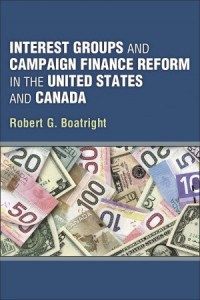Most of my research has had something to do with campaign finance. My work on primary elections and on municipal politics (listed on some of the other pages of this website) all incorporates campaign finance data. I’m currently working on one project on the rather esoteric subject of political contribution disclosure thresholds and another on the perhaps equally esoteric subject of the financing of party conventions.
I have written several recent articles and book chapters about campaign finance in the US. I’m the author of the concluding chapter of the Brookings Institution’s Financing the 2020 Election and Financing the 2024 Election edited volumes; you can watch a video on the 2020 book here. I’m also the author of the Oxford annotated bibliography on campaign finance, available here; a member of several task forces on campaign finance reform; see here and here. Here and here are a couple of videos where I offer my thoughts on the state of US campaign finance today. Finally, here is the amicus brief I helped to write in the doomed Supreme Court case of Lieu v. FEC, outlining some of what we saw as the harmful consequences of the rise of unregulated spending in US elections.

My major book on campaign finance is Interest Groups and Campaign Finance Reform in the United States and Canada. This is a study of how, as the title suggests, American and Canadian interest groups responded to their nations’ campaign finance reform laws of the 2000s. The book was published in 2011. You can buy a copy of it, find a summary of it, read sample chapters, and so on at the University of Michigan Press website. The Press also has a couple of blog posts I wrote about the book, which are here and here. If you’re already familiar with the book, you can find a list of related material, with links, below.
Related Work Comparing the US and Canada:
“Cross-Border Interest Group Learning” (unpublished supplemental material for the book).
“The End of the Reform Era? Campaign Finance Retrenchment in the United States and Canada,” The Forum 10 (2), 2012.
“Campaign Finance Reform and the Democratic Deficit in the United States,” in Imperfect Democracies: The Democratic Deficit in Canada and the United States, ed. Richard Simeon and Patti Lenard (Vancouver, BC: University of British Columbia Press, 2012).
“Lessons for Canada from the American Campaign Finance Reform Experience,” in Money, Politics, and Democracy: Canada’s Party Finance Reforms, ed. Lisa Young and Harold Jansen (Vancouver, BC: University of British Columbia Press, 2011).
“The Place of Quebec in Canadian Interest Group Politics,” American Review of Canadian Studies 45: 2-19 (2011).
“Cross-Border Interest Group Learning in Canada and the United States,” American Review of Canadian Studies 43: 418-437 (2009).
“Interest Group Adaptations to Campaign Finance Reform in Canada and the United States,” Canadian Journal of Political Science 42: 17-43 (2009).
And here’s a list of older stuff I’ve written on US Campaign Finance:
“Financing the 2012 Elections.” In The American Elections of 2012, ed. Steven E. Schier and Janet Box-Steffensmeier. New York: Routledge (2013).
“The Chamber of Commerce and the Citizens United Decision.” In Interest Groups Unleashed, ed. Chris Deering, Paul Herrnson, and Clyde Wilcox. Washington, DC: Congressional Quarterly Press, 2012, pp. 23-48.
“Fundraising: Present and Future.” In Campaigns on the Cutting Edge, 2nd ed., ed. Richard Semiatin. Washington, DC: Congressional Quarterly Press, 2012, pp. 11-27.
“Regulating and Reforming Group-Based Electioneering.” In Congressional Quarterly Guide to Interest Groups and Lobbying in the United States, ed. Burdett Loomis. Washington, DC: Congressional Quarterly Press, 2011.
“Financing the 2008 Elections.” In The American Election of 2008, ed. Steven E. Schier and Janet Box-Steffensmeier. Lanham, MD: Rowman and Littlefield, 2009, pp. 137-160.
“Fundraising: Present and Future.” In Campaigns on the Cutting Edge, ed. Richard Semiatin. Washington, DC: Congressional Quarterly Press, 2008, pp. 10-26.
“Situating the New 527 Groups in Interest Group Theory.” The Forum Vol. 5, Issue 2 (2007).
“Adaptations and Alliances: Strategic Decisionmaking by Ongoing Interest Groups and Advocacy Organizations.” With Michael J. Malbin, Mark J. Rozell, and Clyde Wilcox. In The Election After Reform, ed. Michael J. Malbin. Lanham, MD: Rowman and Littlefield, 2006, pp. 112-138.
“Does Publicizing A Tax Credit for Political Contributions Increase Its Use? Results from a Randomized Field Experiment.” With Donald P. Green and Michael J. Malbin. American Politics Research 34 (4): 563-82 (2006).
“Political Contribution Tax Credits and Citizen Participation.” With Michael J. Malbin. American Politics Research.33 (6): 787-817 (2005).
Political Advertising Vouchers for Congressional Candidates: What Difference Could They Make? Washington, DC: The Campaign Finance Institute, 2005.
“BCRA’s Impact on Interest Groups and Advocacy Organizations.” With Michael J. Malbin, Mark J. Rozell, and Clyde Wilcox. In Life After Reform: When the Bipartisan Campaign Reform Act Meets Politics, ed. Michael J. Malbin. Lanham, MD: Rowman and Littlefield, pp. 43-60.

